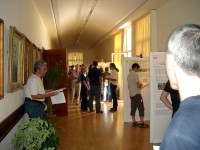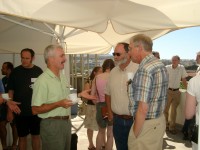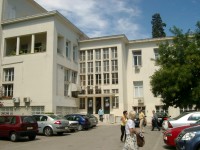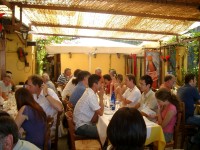|
ECOLOGY OF APHIDOPHAGA 10 - ATHENS 2007
An article for Antenna by Helmut van Emden
There are many
serial conferences in different areas of entomology, but for those working on
natural enemies of aphids a high priority has to be the Ecology of
Aphidophaga series. The series was founded by the distinguished coccinellid
researcher Ivo Hodek, with the first conference held in 1965 at Liblice Castle
near Prague. Forty-two years later, the series is still going strong. It has
always attracted an international participation although so far all the
meetings but one have been held in Europe. Who can forget the 1993 Aphidophaga
5 held in a holiday camp in Antibes with red wine ad lib coming out
of a tap in the wall of the dining room!
The 10th in the series was held at the Agricultural University of
Athens from 6th and 10th September 2007. The venue, on the second floor of the
Old Library, was a superb choice. The large lecture room was flanked by a wide
corridor providing ample space for the registration desk at one end and then
all the posters as well, while across the corridor from the main door of the
lecture room was a large balcony where we could all enjoy coffee breaks,
excellent buffet lunches and networking in the sunshine with a splendid view of
the Acropolis. It was all so well thought out and implemented by Dr Nikos Kavallieratos
and his local organising team from the University's entomology group.
Seventy entomologists from 22 countries attended. This is a very
comfortable number, enabling a 'family' atmosphere to develop and particularly
making it possible for the organisers to accommodate all the presentations in a
single programme without the need for concurrent sessions. Slots for offered
papers were in general 15 minutes, with longer ones for invited speakers. Those
attending were therefore able to participate in the entire conference.
A real
strength and joy of the Aphidophaga meetings is that there is no
'applied' agenda. Although the organisms we were all talking about can be used
in biological control, and many of the speakers earn their crust under that banner, Aphidophaga meetings welcome all good and interesting science, whether or not it
has practical value. As the result of the friendly atmosphere that quickly
develops at these meetings, discussion is genuine and informative, and most
speakers left time for it at the end of their slot.
With 60 oral
presentations, the organisers grouped the papers under session headings (number
of presentations in brackets): Hemiptera as aphid predators (3); Foraging
and habitat selection (6); Non-aphid food of Aphidophaga (5); Ecology
and behaviour of Coccinellidae (9); Food relations (6); Biological
control (7); Ecology and behaviour of aphid parasitoids (7); Parasitoids
and pathogens of Aphidophaga and aphid pathogens (6); Benefits and risks
associated with exotic Aphidophaga (4); Intraguild interactions (5);
Miscellaneous (2). 34 posters were also presented.
What did stand out, however, was that - in contrast to
Aphidophaga 9 in 2004 in the Czech Republic - syrphids had few champions in
comparison with coccinellids. There was just one paper on pathogens of aphids;
one wonders whether insect pathologists working with aphids realise they would
be most welcome.
The
participants received a well-produced book comprising the programme and
abstracts of both oral presentations and posters. However, many full papers
from the meeting will be published next year in the European
Journal of Entomology..
The concentration needed for long days of sessions in the lecture
room is relieved at each Aphidophaga meeting by a day tourist excursion
on the middle day. For Aphidophaga 10, the not unexpected choice was a
coach tour of the sights of Athens, including a main stop at the Acropolis. The
conference needed two coaches. I can only speak for the one I was in, but our
guide was a lady who spoke excellent English, was a fount of useful but not
irritatingly over-detailed information and had a great sense of humour. Those
who had never been to the Acropolis before must have found it the mind-blowing
experience it was for me 10 years ago. Excursion lunches at conferences are
often not five-star and frequently seem more successful for the restaurant than
for the captive customers. Not at Aphidophaga 10. We completely took
over an open-air Taverna at the foot of the Acropolis and were wined and dined
superbly by a friendly and attentive staff. It says much for this Taverna that,
on the remaining two days, members of the conference found their way back there
for their evening meal.
With no
University accommodation used for the meeting, we all stayed in hotels in the
centre of Athens, and used local buses to and from the University. It was easy
after learning the ropes on the first day, especially as the bus went over a
level crossing shortly before reaching the University. The passage over the
rails was quite a seismic event, but it did mean we never missed our stop
however deep in conversation we had become!
My hotel was
called "La Mirage"; I presumed the name derived from the fact that
the reception lobby was quite posh! One got to know conference members at one’s
own hotel better than the others, especially over breakfast and so the groups
that set forth in the evening to seek a restaurant for dinner tended to be
hotel-specific. This is one of the few criticisms I can come up with for Aphidophaga
10.
How did I
fare? I was kept up to date in an area highly relevant to my own research and
made several valuable new contacts with younger entomologists as well as
meeting again with friends from outside the UK. I have several past students in
Athens who I enjoyed seeing again and who generously entertained me. If I
measure the impact of a meeting on me by the length of my list of “things to do
on return”, then Aphidophaga 10 was especially rewarding. These days, in
retirement, all costs of conferences have to come out of my own pocket and I
can say in all honesty that this meeting was worth every euro, and more. My congratulations
to the scientific committee and the local organisers; I enjoyed good science
and great hospitality. If you work on natural enemies of aphids and enjoy good
science for its own sake as well as for any application, I urge you to be at
the next Aphidophaga at Perugia in Italy in 2100. At Athens I found
myself the only participant who had been at the first meeting in 1965; I
certainly intend to be at Perugia.
A final
memory – in my presentation I had just reached the best bit, but with a surprising
next result still to come. I remember saying "Did you enjoy that
bit?" The audience acknowledged they had. "You'll really enjoy the next
bit", I boasted. And I was right, they really did – for at that point I
accidentally fell off the stage!
Helmut van Emden
h.f.vanemden@reading.ac.uk




|
Access number (start 4th Oct 2004) is counted by WWW counter
Access number (start 4th Oct 2004) is counted by WWW counter